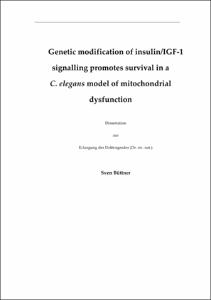Büttner, Sven: Genetic modification of insulin/IGF-1 signalling promotes survival in a C. elegans model of mitochondrial dysfunction. - Bonn, 2016. - Dissertation, Rheinische Friedrich-Wilhelms-Universität Bonn.
Online-Ausgabe in bonndoc: https://nbn-resolving.org/urn:nbn:de:hbz:5n-43129
Online-Ausgabe in bonndoc: https://nbn-resolving.org/urn:nbn:de:hbz:5n-43129
@phdthesis{handle:20.500.11811/6735,
urn: https://nbn-resolving.org/urn:nbn:de:hbz:5n-43129,
author = {{Sven Büttner}},
title = {Genetic modification of insulin/IGF-1 signalling promotes survival in a C. elegans model of mitochondrial dysfunction},
school = {Rheinische Friedrich-Wilhelms-Universität Bonn},
year = 2016,
month = may,
note = {Mitochondria are organelles in the cytoplasm of almost all eukaryotic cells. They supply large quantities of energy in the form of adenosine triphosphate (ATP) and are involved in cell signalling, differentiation and cell death. Mutations in mitochondrial genes cause organelle dysfunction and lead to a heterogeneous group of disorders. Apoptosis Inducing Factor (AIF) is a mitochondrial protein required for the maintenance of respiratory complex subunits and efficient oxidative phosphorylation (OXPHOS). Altered AIF function causes severe human pathologies and recapitulates the majority of features commonly observed in other mitochondrial disorders. There are no available treatments for mitochondrial disorders.
The present study demonstrates that AIF (or WAH-1 in nematodes) deficiency results in electron transport chain (ETC) defects in Caenorhabditis elegans. Consequently, impaired OXPHOS leads to defective mitochondrial function and shortens nematode lifespan. Conversely, reduced insulin/IGF-1 signalling elicits a compensatory response that results in lifespan extension independent of the downstream transcription factor DAF-16/FOXO. Compromised OXPHOS and decreased insulin/IGF-1 signalling promote stress response, AMPK/AAK-2 activation and autophagy. Importantly, enhancing AMPK/AAK-2 activity is sufficient to extend the survival of AIF/WAH-1 impaired animals and requires autophagy.
The identified cellular response mechanisms result in metabolic remodelling, protect from altered mitochondrial respiration and ultimately lead to increased survival of animals with compromised OXPHOS. These results may contribute to the development of novel strategies for the treatment of mitochondrial disorders.},
url = {https://hdl.handle.net/20.500.11811/6735}
}
urn: https://nbn-resolving.org/urn:nbn:de:hbz:5n-43129,
author = {{Sven Büttner}},
title = {Genetic modification of insulin/IGF-1 signalling promotes survival in a C. elegans model of mitochondrial dysfunction},
school = {Rheinische Friedrich-Wilhelms-Universität Bonn},
year = 2016,
month = may,
note = {Mitochondria are organelles in the cytoplasm of almost all eukaryotic cells. They supply large quantities of energy in the form of adenosine triphosphate (ATP) and are involved in cell signalling, differentiation and cell death. Mutations in mitochondrial genes cause organelle dysfunction and lead to a heterogeneous group of disorders. Apoptosis Inducing Factor (AIF) is a mitochondrial protein required for the maintenance of respiratory complex subunits and efficient oxidative phosphorylation (OXPHOS). Altered AIF function causes severe human pathologies and recapitulates the majority of features commonly observed in other mitochondrial disorders. There are no available treatments for mitochondrial disorders.
The present study demonstrates that AIF (or WAH-1 in nematodes) deficiency results in electron transport chain (ETC) defects in Caenorhabditis elegans. Consequently, impaired OXPHOS leads to defective mitochondrial function and shortens nematode lifespan. Conversely, reduced insulin/IGF-1 signalling elicits a compensatory response that results in lifespan extension independent of the downstream transcription factor DAF-16/FOXO. Compromised OXPHOS and decreased insulin/IGF-1 signalling promote stress response, AMPK/AAK-2 activation and autophagy. Importantly, enhancing AMPK/AAK-2 activity is sufficient to extend the survival of AIF/WAH-1 impaired animals and requires autophagy.
The identified cellular response mechanisms result in metabolic remodelling, protect from altered mitochondrial respiration and ultimately lead to increased survival of animals with compromised OXPHOS. These results may contribute to the development of novel strategies for the treatment of mitochondrial disorders.},
url = {https://hdl.handle.net/20.500.11811/6735}
}






